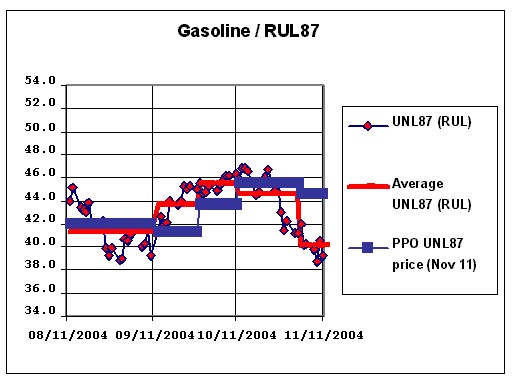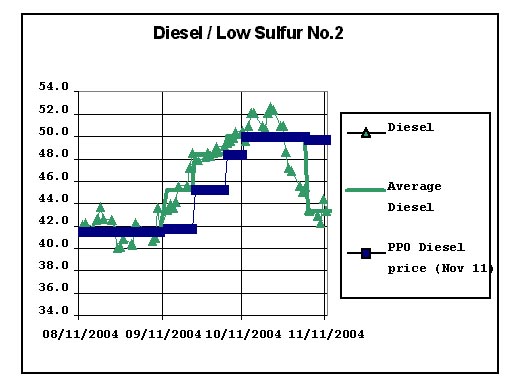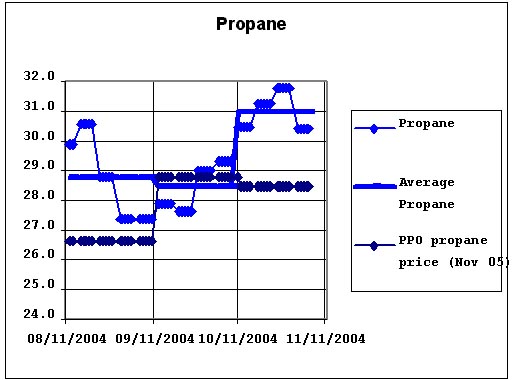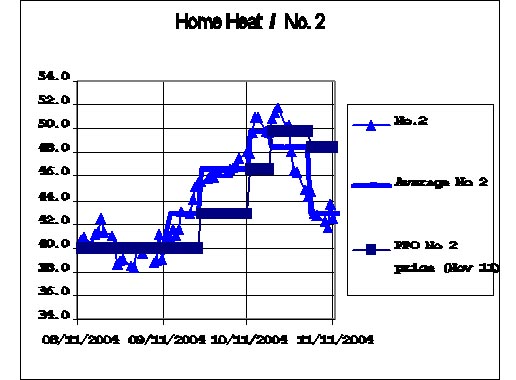|
The following is being distributed at the request of the Petroleum Pricing Office: Downturn in markets reduce most fuel prices in Newfoundland and Labrador Recent declines in world market prices support the Board of Commissioners of Public Utilities Petroleum Pricing Office (PPO) decision to make among the largest reductions this year in the province�s maximum allowable regulated fuel prices for all fuels, except propane. David Toms, PPO director (acting), acknowledges that many consumers do not understand why the office didn�t move prices again before the 15th following two recent downward adjustments in Newfoundland and Labrador fuel prices (November 6 for gasoline and home heating fuel and November 7 for diesel). "Although commodity prices continued dropping from record levels in the previous period, adjustments to maximum allowable fuel prices resulting from the interruption formula occur only when established criteria are met," he explained. "This applies equally to both increases and decreases. Here we have a situation where consumers have the opportunity to enjoy the results of this downward turn on the market, and know that we are not here to subjectively meet their wants, but to meet the needs of all stakeholders. "If local markets could be characterized as highly competitive, large volume markets (which they are not), then market forces would dictate that retail prices would be adjusted to move with commodity prices. With regulation, when price adjustments are made to the PPO benchmark, it must be based on the average of commodity prices since the last time prices were set, and not in a manner for giving unfair advantage to one group of stakeholders at the expense of another." Effective 12:01 a.m. Monday, November 15, the price for all types of gasoline will decrease by 5.1 or 5.2 cents per litre (cpl) � depending on the HST rounding effect for a particular pricing zone - and diesel by 7.3 cpl. In the case of home heating fuel, the PPO will again begin incorporating the added cost of a jet blend into furnace oil prices until next spring/summer. The blending process involves mixing jet fuel with furnace oil in order to improve its storage and usage performance during the colder months. Therefore, the maximum prices for No. 2 blend furnace oil will be lowered by 4.90 cpl and stove oil by 5.50 cpl. Residential propane used for home heating purposes, which was last adjusted October 15, will see an increase of 2.5 cpl. "Consumers will likely wonder if the decreases are the beginning of a trend," said Mr. Toms. "If the numbers support further decreases or increases, then our office will act accordingly." MARKETS One of the leading factors affecting petroleum product figures was a drop in the price of crude oil on the New York Mercantile Exchange (NYMEX) from its high of $55.67 US. This price reduction was driven by reports that oil supplies had grown because of a continuing recovery of production and exports from the Gulf of Mexico following damage from tropical storms in August. There has also been a higher output in production from countries, such as Saudi Arabia, Norway, Nigeria (despite threats of an oil workers� strike November 16) and the U.S. Distillate fuel (home heating fuel and diesel) supplies are still reported to be in the lower-than-average range for this time of year. However, many refiners are returning to normal operations following routine maintenance shutdowns, which means increasing crude oil supplies will assist in heightening the production of various fuels and replenishing stocks, such as home heating oil, and could meet the impending winter demand. But Mr. Toms cautioned that pricing for these fuels can still be impacted by a variety of circumstances, such as whether or not there actually are sufficient supplies to meet the demands of the upcoming winter or the resultant pressures of any geopolitical events. "There are many factors that impact on home heating fuel prices. Reduced demand resulting from higher temperatures is certainly one of these, as is inventory levels or supply." Gasoline inventories continue to be in a comfortable range to keep up with the present demand.Residential propane has not been subject to the same pressures as the other fuels on the market. Although inventories were up from last year, and temperatures are above normal, increased propane prices resulted from more industrial use and consumers stocking up. LABRADOR PRICE FREEZE PPO policy on this matter is the result of past consultations with stakeholders from that region, explained Mr. Toms, and is largely based on difficulties associated with bringing fuel into the area during the winter months. BACKGROUNDER The PPO uses its interruption formula whenever market prices for regulated fuels meet established criteria. For the interruption formula to be used on gasoline and distillate fuels, the PPO requires the average of market prices to be 3.5 cpl greater or less than the current PPO benchmark prices (except propane, which requires +/- 5.0 cpl) over five market business days. The interruption formula is not used for five market days after new prices are set under regulation. At the very least, five market days are deemed necessary to obtain an average for the following normal period. As well, PPO prices are not adjusted at the end of a pricing period during the last five market days, since this would interfere with the regularly scheduled pricing adjustments on the 15th of each month. PPO benchmarks are based on the average price of refined products. Illustrated in the following graphs is market-price performance of all products regulated by the PPO over recent regularly scheduled periods up to November 11, 2004:
2. Heating Fuels - Maximum Tank Wagon (or ** TankFarm) Prices - November 15, 2004 3. Heating Fuels - Residential Propane - Maximum Tank Wagon Prices - Effective November 15, 2004 Media contact: Michelle Hicks, Communications, (866) 489-8800 or (709) 489-8837 2004 11 15 10:40 a.m. |
||
|








